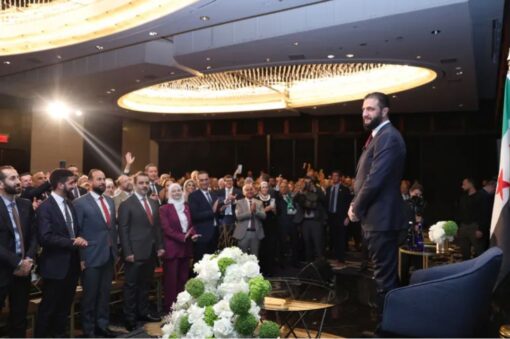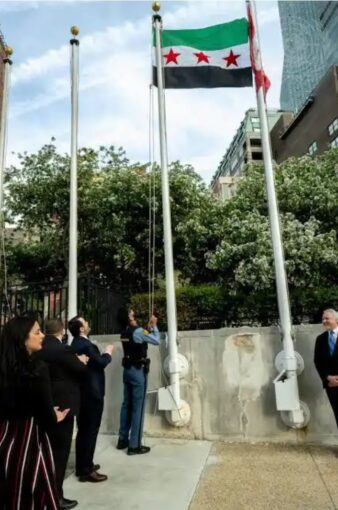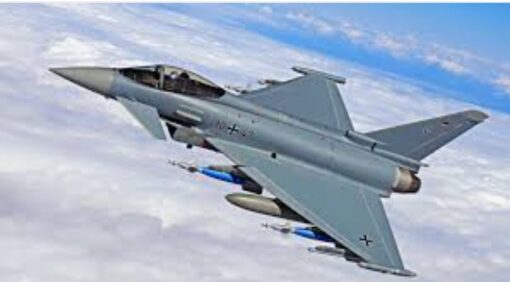For the first time in sixty years, a Syrian president has walked into the chamber of the United Nations General Assembly, marking a diplomatic shift that many international observers are calling historic.
President Bashar al-Sharaa, long a figure both reviled and defended across the Middle East, arrived in New York on Sunday to deliver a speech before world leaders at the 80th UN General Assembly session, ending Syria’s decades-long absence from the podium.
The appearance is already being described by diplomats as “a watershed moment for Syria’s re-emergence into global politics.” It comes amid rising regional negotiations, shifting alliances, and renewed debates on how the war-torn country should be engaged after years of conflict, isolation, and sanctions.
“The fact that a Syrian leader is addressing the UNGA after six decades is not just symbolic,” said a European envoy who asked not to be named. “It signals an attempt to reposition Syria within the international order at a time when the Middle East is experiencing seismic changes.”
A return after decades of silence
The last time a Syrian president stood at the UNGA podium was in the early 1960s, during the volatile years following the short-lived United Arab Republic union between Egypt and Syria. Since then, the country’s leadership had been absent, with Damascus often at odds with Western capitals and increasingly entrenched in regional disputes.

Al-Sharaa’s visit marks the end of that long silence. His decision to attend was reportedly months in the making, with behind-the-scenes diplomatic outreach involving both Arab neighbors and non-aligned states. Several regional powers, including Iraq and Egypt, are believed to have encouraged Syria’s participation as part of a wider push for reconciliation within the Arab League and beyond.
In his opening remarks, al-Sharaa framed Syria’s re-entry into the UN stage as a matter of “historical justice.” He told delegates: “Syria has suffered isolation, war, and sanctions, but we have never abandoned our belief in multilateralism. This visit shows that no nation, no matter how isolated, can be permanently erased from the international community.”
Mixed reactions from global powers
Reactions to the Syria UN visit have been sharply divided. Arab states largely welcomed the gesture as a sign of reconciliation and a chance to rebuild diplomatic channels. Saudi Arabia’s delegation praised what it called “a step toward reintegration,” while Algeria described it as “a necessary move to restore regional balance.”
Western leaders, however, were far more guarded. The U.S. delegation, while stopping short of outright condemnation, expressed skepticism. “We cannot ignore the unresolved humanitarian crisis, nor the responsibility of the Syrian government in years of conflict,” a U.S. official told reporters.
European Union representatives echoed similar caution, with France’s foreign minister stating: “A speech at the UN does not erase accountability. Dialogue must be linked with real commitments on human rights, political reform, and reconstruction.”
Russia and China, both longtime allies of Damascus, were strongly supportive. Russian Foreign Minister Sergey Lavrov said the event showed that “efforts to isolate Syria have failed,” while Beijing hailed the speech as proof of “a multipolar world order that values sovereignty above unilateral sanctions.”
The weight of history
For Syrians themselves, the symbolism of seeing their president on the UN stage carried profound weight. The country has endured more than a decade of devastating civil war, foreign interventions, and economic collapse. Many citizens, even those critical of the government, expressed a sense of cautious pride.
“It doesn’t mean our problems are solved, but at least Syria is not invisible anymore,” said Lina, a teacher from Damascus reached by phone. “We were erased from the international conversation for too long.”
Analysts note that al-Sharaa’s presence is designed to send multiple signals. To regional neighbors, it suggests Damascus is ready to normalize relations after years of estrangement. To global powers, it is a reminder that Syria cannot be bypassed in conversations about Middle Eastern security.
A speech balancing sovereignty and outreach
In his 40-minute address, al-Sharaa blended defiance with outreach. He condemned what he called “illegal interventions” in Syria, pointing specifically to U.S. troop deployments in the northeast and Israeli strikes on Syrian territory. “No country has the right to dictate Syria’s future or occupy its land,” he declared.
At the same time, he struck a conciliatory note by inviting international partners to join in post-war reconstruction efforts. “Our people need bridges, not walls,” he said. “We are ready to work with all nations that respect sovereignty and the principles of the United Nations Charter.”
Observers noted the careful balancing act: a reaffirmation of sovereignty paired with hints of economic and diplomatic openness.
What this could mean going forward
Whether the Syrian leader UNGA appearance translates into substantive change remains to be seen. Diplomats warn that symbolic gestures do not necessarily lead to policy shifts. Yet the mere fact of al-Sharaa’s presence is already shaping conversations.

UN officials privately say Syria’s attendance may open the door for renewed talks on humanitarian aid, refugee repatriation, and sanctions relief. Several aid agencies are urging world leaders to seize the opportunity. “Re-engagement must prioritize the needs of ordinary Syrians,” said an NGO representative in New York.
Regionally, the visit is expected to accelerate Syria’s reintegration into Arab institutions. Already, several Arab League members are lobbying for expanded cooperation on trade and counterterrorism.
For Western governments, the dilemma is sharper. Engaging with Syria risks criticism from human rights groups and political opponents, while maintaining total isolation could reduce leverage at a time when regional dynamics are shifting rapidly.
Global attention on a changing Middle East
Al-Sharaa’s United Nations appearance comes at a time when the Middle East is undergoing major transformations. Growing recognition of Palestine by European states, shifting alignments between Gulf countries and Asia, and continued tensions with Israel all form the backdrop for Syria’s return to the diplomatic spotlight.
In this context, Syria’s re-entry into the UN stage could be both a symbolic turning point and a practical necessity. As one Middle Eastern analyst put it: “You can’t redraw the map of the region while pretending Syria doesn’t exist. This visit acknowledges that reality.”
Whether al-Sharaa’s speech is remembered as a turning point or a fleeting headline will depend on what follows: tangible policy changes, renewed dialogue, and concrete steps to alleviate Syria’s humanitarian crisis.
For now, however, the historic sight of a Syrian president at the UNGA after sixty years underscores one fact: Damascus is no longer silent, and the world is watching closely.


